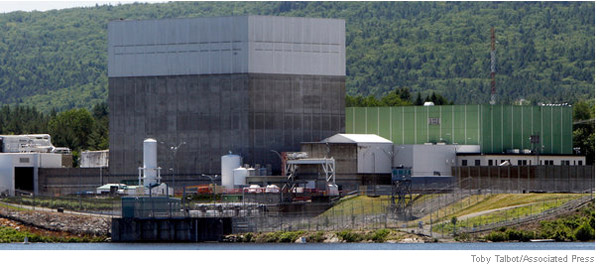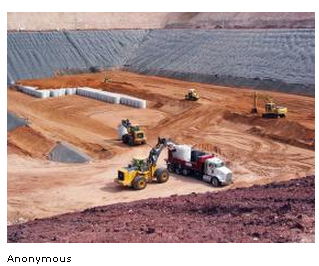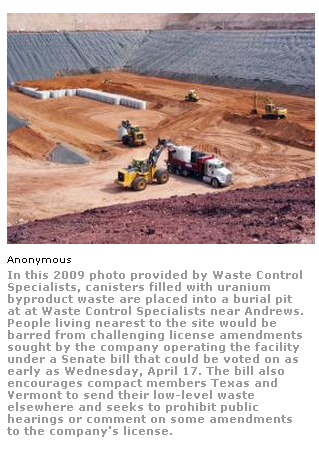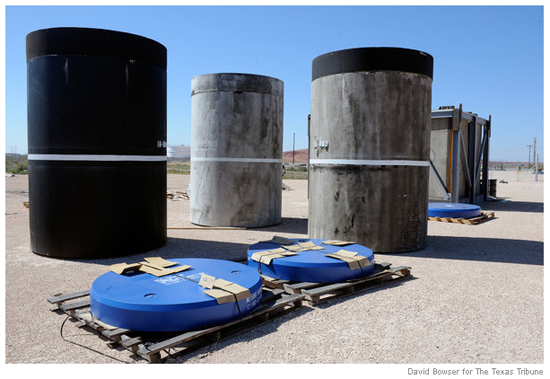Author Archive
107 U.S. Nuclear Reactors Vulnerable to Attack
August 15, 2013
By Polly Ross Hughes
Texas Energy Report
Study finds South Texas Project defenseless from potential sea-based terrorist strike
More than a decade after the worst terrorist attack in U.S. history, all 104 of the nation’s commercial nuclear reactors and three research reactors remain inadequately protected from ‘credible’ terrorist attacks, according to the Nuclear Proliferation Prevention Project at the University of Texas at Austin.
The report commissioned by the Pentagon found that terrorists could wage a sabotage attack to cause a nuclear meltdown or steal bomb-grade materials to make a nuclear weapon.
"More than 10 years have come and gone since the events of September 2001, and America’s civilian nuclear facilities remain unprotected against a terrorist attack of that scale", said Alan J. Kuperman, coordinator of the Nuclear Proliferation Prevention Project and co-author of the report, ?Protecting U.S. Nuclear Facilities from Terrorist Attack: Re-assessing the Current ?Design Basis Threat? Approach.?
"Instead, our civilian reactors prepare only against a much smaller-scale attack, known as the ‘design basis threat’, while the government fails to provide supplementary protection against a realistic 9/11-type attack," Kuperman continued in a release issued with the report. ?"It would be a tragedy if the United States had to look back after such an attack on a nuclear reactor and say that we could have and should have done more to prevent the catastrophe." The South Texas Project near Bay City in Matagorda County is among 11 nuclear power reactors deemed at highest risk. The South Texas Nuclear Generating Station, owned by NRG Energy and the cities of San Antonio and Austin, is among eight that research shows are vulnerable to water-borne attacks. The others listed as unprotected from attacks from sea include Diablo Canyon in California, St. Lucie in Florida, Brunswick in North Carolina, Surry in Virginia, Indian Point in New York, Millstone in Connecticut and Pilgrim in Massachusetts.
Three civilian research reactors pose a danger and raise particular concerns because they are fueled with bomb-grade uranium, including the National Institute of Standards and Technology, located just two dozen miles from the White House. The others that will continue to use bomb-grade uranium for at least another decade are the Massachusetts Institute of Technology in Cambridge and a research reactor at the University of Missouri in Columbia. Unlike military facilities that hold the same materials, the research reactors are not defended against a high-impact or lesser terrorist threats, the research shows.
"Less than two dozen miles from the White House and Capitol Hill, a nuclear reactor contains bomb-grade uranium, but it is not required to protect against even the lesser ‘design basis threat’ of terrorism," said Kuperman. "We know where the weak spots are when it comes to nuclear facilitates, so it would be the height of irresponsibility to fail to take action now."
Despite the toll of the 9/11 attacks, most operators of nuclear reactors are not required to defend against attacks from airplanes, attacks from sea or even against easy-to-obtain, high-power sniper rifles, he pointed out. Cost of such security poses one hurdle but security officials often claim that terrorist don’t value the sites or that the effects of potential attacks would not be catastrophic.
Kuperman disagrees and says it is not possible to know which nuclear targets terrorists might prefer or which types of attacks would pose the greatest harm. The NPPP recommends that all potentially high-value targets, including both nuclear power reactors and civilian research facilities, should be protected against maximum terrorist attacks. He suggested the U.S. Nuclear Regulatory Commission upgrade its protection standards and that the federal government provide needed extra security.
The full report can be found here.
Copyright August 15, 2013, Harvey Kronberg, www.texasenergyreport.com, All rights are reserved
This document contains copyrighted material whose use has not been specifically authorized by the copyright owner. SEED Coalition is making this article available in our efforts to advance understanding of ecological sustainability, human rights, economic democracy and social justice issues. We believe that this constitutes a "fair use" of the copyrighted material as provided for in section 107 of the US Copyright Law. If you wish to use this copyrighted material for purposes of your own that go beyond "fair use", you must obtain permission from the copyright owner.
Appeals Court Blocks Attempt by Vermont to Close a Nuclear Plant
August 14, 2013
Matthew L. Wald
New York Times

Washington – States cannot shut down nuclear plants over safety worries, the United States Court of Appeals for the Second Circuit ruled on Wednesday, upholding a lower court’s decision that allowed the Vermont Yankee plant to keep running despite a seven year effort by the Vermont Legislature to close it.
"The nuclear power industry has just been delivered a tremendous victory against the attempt by any state to shut down federally regulated nuclear power plants," said Kathleen Sullivan, a lawyer for Entergy, which owns the Vermont Yankee.
Read more at the New York Times website
This document contains copyrighted material whose use has not been specifically authorized by the copyright owner. SEED Coalition is making this article available in our efforts to advance understanding of ecological sustainability, human rights, economic democracy and social justice issues. We believe that this constitutes a "fair use" of the copyrighted material as provided for in section 107 of the US Copyright Law. If you wish to use this copyrighted material for purposes of your own that go beyond "fair use", you must obtain permission from the copyright owner.
Bill would stop New Mexico residents from challenging Texas waste dump
April 16, 2013
By Asher Price, Staff
Austin American-Statesman

In this Oct. 14, 2009, photo provided by Waste Control Specialists, canisters filled with uranium byproduct waste are placed into a burial pit at a site in Andrews County. People living nearest to the site would be barred from challenging license amendments sought by the company under a Senate bill that could be voted on as early as Wednesday. (AP Photo/Waste Control Specialists, File)
The Sierra Club’s efforts to thwart a radioactive waste dump in West Texas could be derailed if a Panhandle state senator succeeds in blocking residents of New Mexico from challenging it in Texas courts.
The proposal by state Sen. Kel Seliger, R-Amarillo, might get a vote on the Senate floor this week. It could effectively cut off the Sierra Club’s challenge to a radioactive waste site in Andrews County, just miles from the New Mexico border, owned and operated by Waste Control Specialists.
The Sierra Club sued in 2009, asking for a contested case hearing on behalf of its members who live in Eunice, N.M., just west of the state line.
Contested case hearings amount to minitrials in which members of the public and others with standing can protest a permit. The judge overseeing the hearing makes a recommendation to the Texas Commission on Environmental Quality.
In 2012, a state district judge granted a contested case hearing, based on issues raised by the Sierra Club’s New Mexico members. That decision has been appealed to a state district court of appeals.
Seliger’s proposal faced tough questions at a Senate Natural Resources Committee meeting in late March.
"Why would we limit affected parties to three sides and not the fourth?" state Sen. Robert Duncan, R-Lubbock, asked Seliger, referring to New Mexico residents, who actually live much closer to the facilities — within a few miles —than virtually any Texans.
"Folks who live in New Mexico still have access to federal courts for any remedy they want," said Seliger, whose campaign in December 2011 and again in March 2012 received donations of $10,000 from WCS-Texas Solution PAC. (Waste Control Specialists is controlled by investor Harold Simmons, a chief donor to Gov. Rick Perry’s campaigns.)
"They’re still property owners; they’re still Americans — whether they be on north side or west side or east side of the plant," Duncan said. "They should still be offered the opportunity" to protest the plant’s permit.
Seliger’s bill would also expand the amount of higher-level radioactive waste the dump may take while not increasing the overall cap on radioactive material at the site.
In 2003, lawmakers permitted Waste Control Specialists to take low-level waste from Texas, Vermont and federal facilities.
Seeking to handle more lucrative forms of waste, the company asked lawmakers to allow it to import more, and in 2011 they agreed but limited imports to 30 percent of the landfill volume.
The Seliger proposal would allow the company to import more highly radioactive waste.
Increasing the import limit could pump an additional $1.25 million a year into the state’s general fund and Andrews County, which each receive 5 percent of the dump’s gross receipts, according to estimates by the Legislative Budget Board.
The facility employs 170 people.
Passing the measure will allow Waste Control Specialists "additional flexibility and allow it to stay strong," said Rodney Baltzer, president of the company.
Cyrus Reed, conservation director of the Lone Star chapter of the Sierra Club, said in a statement that the proposal "not only reflects a lack of respect for the neighboring state, but it invites possible litigation for failing to recognize the rights and concerns of residents who are virtually neighbors to this radioactive waste site."
This document contains copyrighted material whose use has not been specifically authorized by the copyright owner. SEED Coalition is making this article available in our efforts to advance understanding of ecological sustainability, human rights, economic democracy and social justice issues. We believe that this constitutes a "fair use" of the copyrighted material as provided for in section 107 of the US Copyright Law. If you wish to use this copyrighted material for purposes of your own that go beyond "fair use", you must obtain permission from the copyright owner.
Nuke bill raises opposition from environmentalists
April 17, 2013

By BETSY BLANEY
ASSOCIATED PRESS
Lubbock Avalanche-Journal
People living nearest to a radioactive waste dump site in Andrews would be barred from challenging the company operating the facility under a bill opponents say further caters to the business.
Senate Bill 791 also encourages members of a compact, Texas and Vermont, to send their low-level waste elsewhere, allows for the company to take in additional, more radioactive material per year and seeks to prohibit public hearings or comment on some changes to the company’s license.
The bill from Sen. Kel Seliger, R-Amarillo, could be voted on as early as Wednesday, April 17. A similar bill has been filed in the House.
Residents of Eunice, N.M., live less than 10 miles from Dallas-based Waste Control Specialists’ 1,300-acre radioactive waste burial ground. Under the bill, they would no longer be able to claim to Texas licensing officials their well-being is affected by the dump. The bill allows for challenges from Texas residents in Andrews County, home to the dump site, and any adjacent Texas county.
Eunice native Rose Gardner has long objected to the dump site, believing that leaks will lead to groundwater contamination. She said she’s long known that someday the company would try to silence her objections.
"There isn’t a Texan living near the state line," the 54-year-old flower shop owner said. "They live 37 miles away in Andrews. And we’re sitting here like little kids playing tiddlywinks."
Company spokesman Chuck McDonald said that part of the bill might not remain. He said Seliger spoke to Sen. Robert Duncan, R-Lubbock, about a proposed amendment.
"I think it’s really a moot point based on the exchange I heard in committee," McDonald said.
A call seeking comment from Seliger was not immediately returned Tuesday, April 16.
The nuclear waste dump site, whose majority owner is billionaire and GOP mega-donor Harold Simmons, accepted its first low-level radioactive waste about a year ago, ending an expensive and yearslong effort by the company to bury materials from medical, research and industrial activities and from nuclear power plants. Also buried there is PCB-tainted sludge dredged from the Hudson River in New York and tons of Cold-War era radioactive waste from a former uranium-processing plant in Ohio.
Environmental groups have opposed the company’s continual pressing for various types of waste to bury in the remote scrub brush terrain about 375 miles west of Dallas.
"It’s just always something more and I have to wonder where this will end," said Karen Hadden, executive director of the Texas SEED Coalition.
Originally the site was to handle low-level waste from compact states, but last legislative session lawmakers approved allowing waste from more than three dozen states to be buried at the facility.
Seliger’s bill also seeks to promote sending low-level waste, known as Class A, out of Texas for burial and ups the annual radiation limit for the next two years from 220,000 to 300,000 curies so that states outside the compact can dispose of hotter waste, known as Class B and C.
The company, Andrews County and the state stand to make more money from the hotter waste. The county receives 5 percent and the state 25 percent of the company’s revenues quarterly.
Lawmakers should play an active role in regulating any future plans by the company to expand the site’s capacity and any change in its license, including the forms, types or streams of waste, Duncan said.
"The Legislature should impose limits on volume and radioactivity in that site," he said. "If those need to be changed later on those limits should be changed through the legislative process."
The bill includes prohibiting public comment or hearings on minor amendments to the license, which is regulated by the Texas Commission on Environmental Quality. The bill defines minor as "a change in the type, volume or concentration limits of wastes to be received to the extent the change does not increase the total volume and curie capacities approved" in the existing license.
McDonald said the license is valid and operations are underway, making the commission the agency to handle regulation.
"They should be the ones to determine if the waste stream meets the waste acceptance criteria," he said. "It’s taking place safely and securely and TCEQ needs the ability to manage it."
That’s not the view of Marisa Perales, an attorney representing the Lone Star Chapter of the Sierra Club in a contested case hearing that a judge last year ruled should have occurred. Waste Control is appealing that ruling.
"It seems to me that what’s occurring is that TCEQ, WCS, the legislature are trying more and more to keep the public out of the process," she said.
This document contains copyrighted material whose use has not been specifically authorized by the copyright owner. SEED Coalition is making this article available in our efforts to advance understanding of ecological sustainability, human rights, economic democracy and social justice issues. We believe that this constitutes a "fair use" of the copyrighted material as provided for in section 107 of the US Copyright Law. If you wish to use this copyrighted material for purposes of your own that go beyond "fair use", you must obtain permission from the copyright owner.
Quarrels Continue Over Repository for Nuclear Waste
June 27, 2013
By MATTHEW L. WALD
New York Times

Concrete canisters, with their blue lids, used to store drums of nuclear waste near Andrews, Tex.
WASHINGTON — As more nuclear reactors across the country are closed, the problem of what to do with their waste is becoming more urgent, government officials and private experts said at a conference here this week.
To address the problem, a bipartisan group of four senators introduced a bill on Thursday that would provide for temporary, centralized storage, even as House leaders remained focused on trying to revive plans for the Yucca Mountain nuclear waste repository that the Obama administration has declared dead.
Nuclear waste is accumulating in steel and concrete storage casks at reactor sites around the country. But the casks — sealed boxes of many tons — cannot be sent to any repository because they are not compatible, said Jeff Williams, director of the Energy Department’s Nuclear Fuel Storage and Transportation Planning Project.
In addition, a growing number of the sites no longer have an operating reactor or the associated fuel-handling equipment, so they have no way to move the highly radioactive fuel to another storage package.
Read the rest of the story on the New York Times website.
This document contains copyrighted material whose use has not been specifically authorized by the copyright owner. SEED Coalition is making this article available in our efforts to advance understanding of ecological sustainability, human rights, economic democracy and social justice issues. We believe that this constitutes a "fair use" of the copyrighted material as provided for in section 107 of the US Copyright Law. If you wish to use this copyrighted material for purposes of your own that go beyond "fair use", you must obtain permission from the copyright owner.


